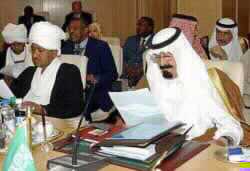Saddam Urged to Step Down at Arab Summit
01/03/2003| IslamWeb
 The United Arab Emirates on Saturday called for Saddam Hussein to step down, the first Arab country to do so publicly. Sheik Zayed bin Sultan Al Nahyan, president of the Persian Gulf nation, submitted a proposal at an Arab League summit urging Saddam and the rest of his leadership to give up power in exchange for immunity from prosecution. He didn't specify what crimes Saddam might be guilty of, but Iraqi dissidents have accused the Iraqi president of crimes against humanity for bloody crackdowns on minorities in Iraq.
The United Arab Emirates on Saturday called for Saddam Hussein to step down, the first Arab country to do so publicly. Sheik Zayed bin Sultan Al Nahyan, president of the Persian Gulf nation, submitted a proposal at an Arab League summit urging Saddam and the rest of his leadership to give up power in exchange for immunity from prosecution. He didn't specify what crimes Saddam might be guilty of, but Iraqi dissidents have accused the Iraqi president of crimes against humanity for bloody crackdowns on minorities in Iraq.
The call defied long-standing resistance among Arab leaders to meddling in each others' domestic affairs. White House spokesman Ari Fleischer said Friday that the only way for Iraq to avoid war is "disarmament and regime change."
Sheik Zayed's letter, circulated among journalists at the summit and formally submitted for debate by the leaders, did not refer explicitly to Saddam but said the entire "Iraqi leadership should step down and leave Iraq with all the appropriate advantages within two weeks of adopting this Arab initiative."
It said the Arab League and the United Nations should then govern until Iraq could return to "its normal situation according to the will of the brotherly Iraqi people."
Sheik Zayed's proposal likely reflected a minority opinion shared mainly by Gulf countries that have long taken the hardest line against Saddam.
The 22-member league was expected to take a more moderate approach when Saturday's summit ends with a pan-Arab declaration on how the Iraq crisis should be addressed.
On Thursday, U.S. Secretary of State Colin Powell urged Arab leaders to call on Saddam to "step down and get out of the way and let some responsible leadership take over in Baghdad."
But Egypt, considered the state in the best position to forge a pan-Arab consensus, said the Arab League could not issue such a call.
"We are not in the business of changing the regime of one country or another," Egyptian Foreign Minister Ahmed Maher said Friday. "We can only ask all parties to abide by international resolutions in order to avoid war."
Privately, however, Arab diplomats said the idea of getting Saddam to step down has been under informal discussion.
In a commentary Saturday in the Saudi newspaper Al-Jazirah, Ali Qorni, a professor of communications at Saudi Arabia's King Saud University, said some Arabs may fear they will be labeled American stooges if they speak out against Saddam.
But he said they should acknowledge that to further political, economic and social stability, "it is in our strategic interests to remove the regime of Saddam Hussein with no sorrow or apologies .... If this is also in the interest of the United States or the West, then this will not hurt us at all."
Diplomats had said the summit may send a high-level delegation to Baghdad carrying a message to Saddam with vague suggestions he quit.
They also raised the possibility of sending an Arab delegation to press Iraq to cooperate with U.N. weapons inspectors trying to determine whether Iraq is hiding weapons of mass destruction.
After two days of debate that preceded the summit, the foreign ministers could not decide whether an Arab delegation would go just to Baghdad or also to the United States, the United Nations and the European Union to stress the need to resolve the crisis peacefully.
The leaders will have to choose between two proposals addressing what role Arabs might play in any war, diplomats said on condition of anonymity. One calls on Arabs not to take part in any attack; a second bars Arabs from allowing America to use their territory as a staging ground.
A Kuwaiti envoy, Sheik Ahmed Fahd Al-Ahmed, told reporters the latter wording was "not realistic" but that Kuwait supported the call on Arabs not to participate in military action.
Tens of thousands of U.S. troops are training in Kuwait ahead of a possible war with Iraq, which invaded Kuwait in 1990 and occupied it until a U.S.-led coalition forced Saddam to retreat in the 1991 Gulf War. Other Gulf countries have been sending troops and arms to help defend Kuwait should Iraq strike Kuwait in reaction to a U.S. attack.
Saudi Foreign Minister Prince Saud Al-Faisal told CNN that a U.S. military occupation of any post-Saddam Iraq would bring "chaos" to the region.
The Arab world has been deeply divided by the U.S.-Iraq confrontation. Some countries, like Kuwait, argue war is inevitable and say the focus should be on planning for the aftermath. A second camp, including Egypt and Saudi Arabia, argues war can be avoided if Iraq cooperates fully with U.N. weapons inspectors.
The proposal to condemn any war not authorized by the United Nations is a step short of the unequivocal anti-war declaration a third camp, led by Syria, is pressing the summit to make.
PHOTO CAPTION
Saudi Arabian Crown Prince Abdullah, right, and Sudanese Foreign Affairs Minister Mustafa Osman Ismail attend the opening session of the the 15th annual Arab summit at Sharm el-Sheik , Egypt, Saturday, March 1, 2003. Arabs opened a crisis summit Saturday with a call on Iraq to cooperate with the United Nations in order not to provide any pretext for war and a condemnation of any possible strike on a fellow Arab state. (AP Photo/Dimitri Messini
www.islamweb.net
